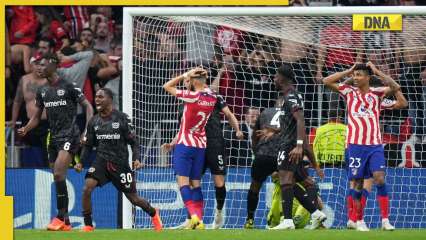Explainer: Why Atletico Madrid were awarded a penalty kick after full-time whistle

Scenes from Atletico Madrid vs Bayer Leverkusen match | Photo: Twitter/ @ChampionsLeague
Spanish giants Atletico Madrid bowed out of the Champions League on Wednesday after a 2-2 draw against German side Bayer Leverkusen, and a chaotic few minutes beyond the final whistle.
Coach Diego Simeone’s Atletico side needed a win to keep their chances of qualification for the knockout stage alive. Leverkusen took the lead twice and Atletico equalised both times. But what will make the game go down in history as a memorable one was the controversial end where a penalty kick was awarded to the club from Madrid after the full-time whistle.
Unfortunately, Atletico missed the penalty kick and were unable to put the ball into the net despite getting two rebounds. Atletico crashed out of the Champions League before the final match day of Group stage but the penalty kick after the final whistle became a talking point.
What happened after the full-time whistle?
Despite blowing the full-time whistle, referee Clement Turpin was sent a message from the VAR referee that he had missed an apparent handball amid the chaos at the end. The referee ran to the VAR screen amid passionate demonstrations from players of both sides.
The referee then pointed to the spot amid jubilations from Atletico players and fans and groans from the other side. However, Yannick Carrasco missed the spot kick and Saul Niguez failed to convert the rebound, effectively ending Atletico’s CL hopes.
Why were Atletico Madrid awarded the penalty kick?
A similar incident took place in a Manchester United vs Brighton, Premier League match in 2020. A header hit the arm of a Brighton player seconds before the full-time whistle. The referee took a similar stance and awarded a penalty to United after the match had ended.
As per the International Football Association Board (IFAB), the body that sets out the laws of football, incident reviews are not bound by time restrictions. This means that games can be permitted to be restarted after the full-time whistle if the referee determines from a VAR check that there was a ‘serious missed incident’.
As per IFAB, the review process has no time limit as “accuracy is more important than speed.”
“The review process should be completed as efficiently as possible, but the accuracy of the final decision is more important than speed. For this reason, and because some situations are complex with several reviewable decisions/incidents, there is no maximum time limit for the review process,” states IFAB.
READ | Explainer: Why was Dinesh Karthik adjudged ‘run-out’ despite Mohammad Rizwan collecting the ball in front of the wickets
For all the latest Sports News Click Here

